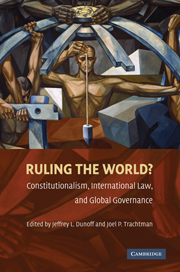Preface: International Institutions: Why Constitutionalize?
Published online by Cambridge University Press: 05 June 2012
Summary
[I]t can feel like a project of the utmost seriousness and urgency to interpret the world in constitutional terms.
–David Kennedy “The Mystery of Global Governance”International institutions, with a few minor and ad hoc exceptions, are firmly grounded in treaties that establish their objectives, conditions of membership, and internal and external operational parameters. These treaties are binding on their party members and, perhaps – in the instance of near-universal organizations – also on nonmembers.
It could be argued that it little matters whether such an institution's foundational instrument is regarded as a constitution. Yet leading thinkers, such as the authors of this volume, seem to think the issue is worth serious examination. They express strongly held views as to why the issue is important and argue that how it is answered can have a significant impact on the role and operation of leading international organizations.
An international organization grounded in a constitution, they believe, has a different gravitas from the many purely ad hoc reciprocal arrangements made for the passing convenience of states.
The authors of these chapters do not merely note the phenomenon of greater gravitas but also explore how constitutionalization affects the practice of an institutionalized system of cooperation. For one thing, it determines how the institution absorbs the need for change. Whereas a constitutionally based system accommodates and adapts to its own practice, lesser consensual arrangements tend to insist on strict literal construction of their terms and resist their transformation through interpretative practice.
- Type
- Chapter
- Information
- Ruling the World?Constitutionalism, International Law, and Global Governance, pp. xi - xivPublisher: Cambridge University PressPrint publication year: 2009
- 2
- Cited by



